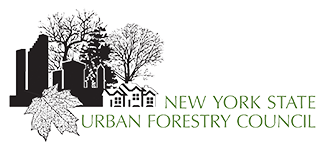
Gloria Van Duyne recently became the new NYSDEC Urban and Community Forestry Program Director. We asked Gloria to share a little about herself, including her extensive experience within DEC.
I was hired in 2005 by Mary Kramarchyk in DEC’s Urban and Community Forestry Program to develop web content and outreach materials. Most recently, I have been the DEC Division of Lands and Forests’ Web and Communications Coordinator, and I have authored several articles in DEC’s Conservationist magazine.
Before coming to DEC, I was the Executive Director at the Landis Arboretum in Esperance, NY. I’ve also worked for The Nature Conservancy in the Delaware Bayshore and for New York Parks and Conservation Association (precursor to Parks and Trails New York), and I’ve volunteered for a variety of organizations. I was the editor of the Taking Root newsletter the last few years it was in print.
I have a Master’s degree from Antioch New England in Natural Resource Management and Not-for-Profit Administration.
I was asked to talk about some peak experiences in my career (paid and volunteer work); here are two. While in Australia for two years with my husband’s job, I volunteered with a bird banding group. Handling the endangered Eastern curlew, the largest shorebird worldwide, was a highlight, but even more so was the people and the relationships I developed within that group.

Eastern curlew (Numenius madagascariensis). Photo by DickDaniels (carolinabirds.org) CC BY-SA 3.0, Wikimedia Commons
The other experience I wanted to mention was attending DEC’s Becoming an Outdoors Woman (BOW) weekend. I took a variety of classes to receive a hunter education certificate. It’s difficult to explain to anyone who has never attended one of these weekends. The energy is described as positive, supportive, and without judgment. But ENERGY should be in capital letters. Knowing I was going to be writing about my experience for the Conservationist, I wasn’t sure how to explain how I felt after the weekend. And then I realized, I felt like I could accomplish ANYTHING!
I’ve chosen to share these experiences because volunteers play such an important role in urban and community forestry. Regional ReLeaf Committees, the Council, community tree boards, and a slew of volunteer community groups are what keep our programs moving forward. It is your passion, enthusiasm, generosity, hard work, and mutual support that has helped strengthen urban forests across the state. Our multiple partnerships are relationships with the goal of greener and healthier urban forests, which in turn make us healthier and happier people.

